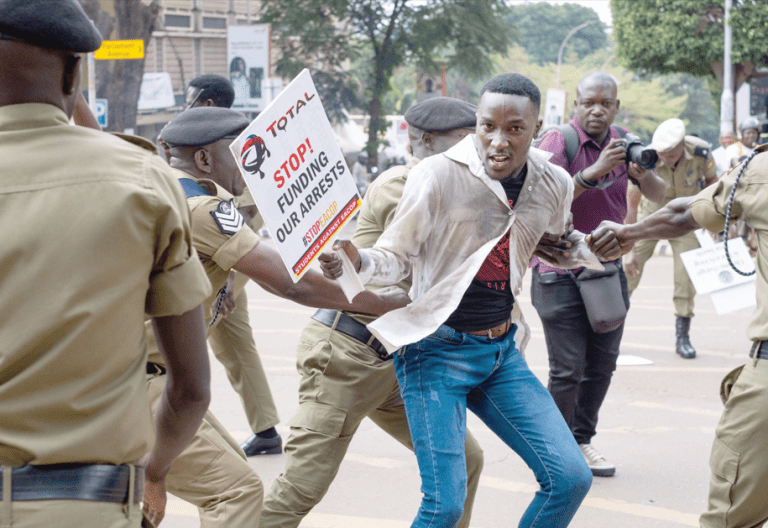Green activists face a world of threats, growing suppression

It is in humanity’s best interest to support people who are pressing governments to meet their obligations on climate change, whether they are protesting on the street, bringing cases to court or even carrying out acts of civil disobedience.
Climate and environmental activists are increasingly facing repression, including criminalisation, suppressive legislation, and other forms of oppression that threaten human rights.
Such has been the scale of intensity in oppression of environment defenders that it has drawn condemnation and legal action from international and national human rights organisations.
“As the climate crisis worsens, the civic space for climate protests is shrinking,” warns Human Rights Watch Deputy Director in charge of Environment and Human Rights, Maria Laura Canineu.
“Instead of meeting their commitments to reduce climate change, governments are threatening environmental protectors – from Indigenous communities defending their ancestral lands to young activists protesting the expansion of fossil fuels – with intimidation, legal harassment, and at times deadly violence,” Canineu wrote in Newsweek last April.
Legislative assault
Four main ways have been identified to criminalise and repress climate and environmental protests. Anti-protest laws are being introduced to criminalise groups, new crimes are being introduced and punishment made more severe for existing crimes, police powers have been increased and officers are granted impunity when harming activists.
The criminalisation trend is continuing, with new anti-protest laws being passed in Australia, the UK and the US. Activists are being labelled as anti-democratic or eco-terrorists. New offences are being created, and harsher sentences imposed.
Other forms of repression involve environmental activism being labelled as a potential terrorist threat. The European Union Terrorism Situation and Trend (TE-SAT) report classifies environmental activism as “extremism”.
Legislation is also being used to ban certain forms of protest.
The United Nations Economic Commission for Europe (UNECE) Convention on Access to Information, Public Participation in Decision-making and Access to Justice in Environmental Matters was adopted on 25 June 1998 in the Dutch city of Aarhus.
Countries that are part of the Aarhus Convention, an agreement that links environmental rights and human rights and acknowledges that we owe an obligation to future generations, are enacting these laws.
Together with other initiatives such as the Escazú Agreement in Latin America and the Caribbean, the Aarhus Convention plays a central role as a powerful advocacy tool for the international human rights community seeking wider protection when demanding ambitious climate policies from governments.
The subject of the Convention goes to the heart of the relationship between people and governments. It is about government accountability, transparency and responsiveness. It grants public rights and imposes on parties and public authorities’ obligations they must commit to.
These international agreements promote transparency, public participation and access to justice in environmental matters. They empower communities and individuals to voice their concerns and hold governments and corporations accountable.
They remind these public bodies of their obligations to address climate change and protect defenders’ basic rights to exercise freedoms of expression, association, and assembly.
During the recent UN Climate Change Conference (COP29) in Baku, Azerbaijan, three leading civil society networks, Climate Action Network, (CAN), Publish What You Pay (PWYP) and Global Campaign to Demand Climate Justice (DCJ), issued a strong statement to world leaders titled ‘Climate Talks and the Chilling Effect: Repression on the Rise’.
It voiced concern over a world on the throes of unprecedented repression regarding climate activists, human rights defenders, journalists, academics and others who express opposing views to their government.
“The problem is widespread. This is an epidemic impeding crucial climate action and violating human rights laws across the world,” the groups asserted.
They called upon all parties, in particular, Azerbaijan, Egypt, Germany, Kenya, the UAE, and the UK to end their crackdown on civil society and journalists, and release all those arbitrarily detained and bring perpetrators to swift justice.
Without these voices of civil society, the fight for climate justice cannot succeed, jeopardising the integrity of climate summits such as COP29 themselves.
“All over the world, thousands of human rights defenders continue their peaceful struggle for the rights of others. Their reward is intimidation, unfair trials on spurious charges, physical and digital attacks, torture, imprisonment and killings, the UN Special Rapporteur on Human Rights Defenders Mary Lawlor said in 2023.
She observed that activists are increasingly being met with repression, criminalisation and stigmatisation, calling on the repression to stop. “Repression doesn’t just silence individuals, it weakens our collective power to secure a sustainable, just future,” said Dunja Mijatović, the Council of Europe’s commissioner for human rights.
Repression continues unabated. More than 1,500 climate and human rights defenders have been murdered since the adoption of the Paris Agreement in 2015. In 2023 alone, 196 defenders were murdered after exercising their right to protect their lands and the environment from harm., with Latin America having the highest number of recorded killings worldwide.
Though the figure could be higher, Global Witness reports that the total number of killings since they started reporting in 2012 now stands at 2,106 murders. The murders occur alongside wider repression and retaliations against people who are being targeted by government, business and other non-state actors with violence, intimidation, smear campaigns and criminalisation.
The Americas is the world’s deadliest region for those defending land, territory and the environment, with 43 per cent being indigenous peoples. Across Europe, the right of peaceful assembly is also coming under severe attack.
States are increasingly stigmatising, criminalising and cracking down on peaceful protestors, imposing unjustified and punitive restrictions and resorting to increasingly repressive means to stifle dissent.
Fuelling protests
This wave of repression is not limited to wealthier nations. In Uganda, environmental defenders and anti-fossil fuel activists routinely face threats and arbitrary arrests for raising concerns over the East African Crude Oil Pipeline – one of the largest and most controversial fossil fuel projects currently under development globally, according to Human Rights Watch.
Student activists protesting the pipeline have been charged with the colonial-era “common nuisance” offence, which the government uses to suppress peaceful protests.
Oscar Berglund and Tie Franco Brotto with three University of Bristol colleagues, recently published a report that shows such repression is indeed a global trend, and that it is becoming more difficult around the world to stand up for climate justice.
The criminalisation and repression span the global north and south, and includes more and less democratic countries. It does, however, take different forms, Berglund and Brotto wrote in The Conversation last week.
“Our report distinguishes between climate and environmental protest. The latter are campaigns against specific environmentally destructive projects – most commonly oil and gas extraction and pipelines, deforestation, dam building and mining. They take place all around the world.”
They note climate protests are aimed at mitigating climate change by decreasing carbon emissions, and tend to make bigger policy or political demands (‘cut global emissions now’ rather than ‘don’t build this power plant’). They often take place in urban areas and are more common in the global north.
Their report says protests are increasing and reiterates the four ways activism is repressed– introduction of anti-protest laws, criminalisation of protests through prosecution and courts, harsher policing and lastly in the most extreme cases, through killings and disappearances.








